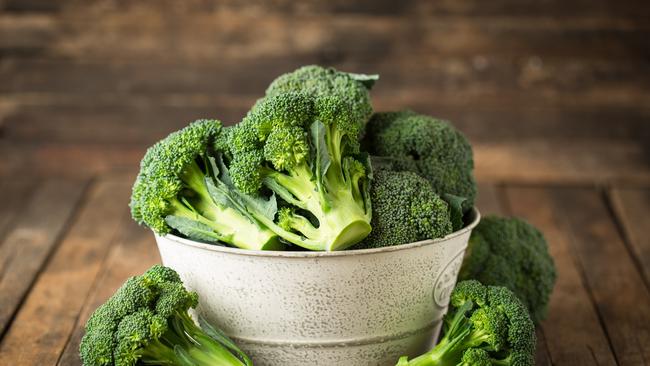One bowl a week of this broth cuts risk of type 2 diabetes
Just one bowlful a week lowers and maintains blood sugar levels. The secret ingredient: a specially bred broccoli.

Sipping any green soup is guaranteed to make you feel virtuous, but perhaps not quite as worthy as I feel drinking the one in front of me, which comes with an impressive stamp of approval for its health-boosting properties.
Developed by scientists at the Quadram Institute, a centre for food and health research that combines the Norfolk and Norwich University Hospitals’ endoscopy centre and the University of East Anglia’s (UEA) Norwich Medical School, the SmarterNaturally soup is a glorified instant soup, prepared from a sachet of dried powder mixed with 250ml boiling water.
It looks – and tastes – nothing special, although it’s thicker and more flavourful than your average packet soup, and yet consumed once weekly has been shown to lower and maintain blood sugar levels to cut the risk of type 2 diabetes.
What sets this super-soup apart is its ingredients: in particular a broccoli that has been bred to produce very high levels of a naturally occurring substance called glucoraphanin, which is converted in the body to the compound sulforaphane.
“What sulforaphane does is turn on a set of genes that are regulated by the protein NRF2, involved in blood sugar control,” says Steve Morrison, a medical biochemist who is head of clinical research for the SmarterNaturally product. “Stored sugar is drawn out of the body and we are prevented from laying down more sugar, so that blood glucose levels are lowered when the glucoraphanin-rich broccoli is consumed regularly.” Just one soup a week is enough: according to one of their papers published in the American Journal of Clinical Nutrition, participants with elevated blood sugar who ate their super-soup weekly saw their blood glucose levels drop to a normal range during the 12-month trial.
Most cruciferous vegetables – including cauliflower, cabbage, kale and Brussels sprouts – contain glucoraphanin, but the broccoli variety being used in the soup contains about five times more glucoraphanin than usual varieties, Morrison says.
It was discovered growing wild in Sicily several decades ago by Richard Mithen, honorary professor in the school of pharmacy at UEA and the lead “soup” scientist, who developed a hybrid of the plant that reliably produces high amounts of beneficial compounds.
“It has been grown using traditional breeding techniques, similar to the way roses are bred to create new varieties, and is non-GM,” Morrison says.
A diet with a high glucoraphanin intake could bring wide-ranging health benefits. Morrison says it helps to recalibrate our metabolism, activating processes in our body that ensure our metabolic machinery functions well.
“It’s a bit like taking your car for a service and getting it retuned so that it works optimally and efficiently,” he says. “As we get older our body mechanics work less well and consuming glucoraphanin regularly helps to keep things ticking over normally.”
It has been shown to help lower blood pressure, to protect against heart disease and to be protective against some forms of cancer, but it is the evidence for its effects on blood sugar control that are most compelling.
According to the charity Diabetes UK, about 13.6 million people in Britain have prediabetes – meaning their blood sugar levels are higher than usual, but not yet high enough for them to be diagnosed with type 2 diabetes. By 2030 the charity estimates that 5.5 million people in the UK will have diabetes, 90 per cent of them the type 2 variety, and in many of those cases adapting diet (reducing refined carbs, increasing vegetable intake) and lifestyle (more physical activity) can reduce the risk.
Morrison and the Quadram team are recruiting participants with prediabetes from the Norwich area for their next trial, which will be checking a blood marker called glycated haemoglobin – a routine blood test that measures accumulation of sugar in the blood and is used to screen for prediabetes.
Over 36 weeks the participants will consume either the broccoli super-soup, a courgette soup or no soup as measurements of this response are taken. “It’s the latest in a programme of human trials we are conducting to obtain the evidence needed for a European health claim for blood glucose reduction, the key thing being that all of the science behind the soup is peer-reviewed and published in quality journals,” Morrison says.
Why soup and not a supplement? The scientists insist that consuming the whole broccoli head, albeit pulped, blended and dried, is important because the plant contains a range of beneficial micronutrients such as fibre, vitamins and minerals that are processed in the gut in a way that no manufactured supplement could match.
“Putting broccoli powder into a capsule would mean you would need to consume several very large capsules to obtain sufficient levels of glucoraphanin,” Morrison says. “And while sulforaphane is available as a supplement, it is in a form that becomes denatured in the gut so it’s less effective.”
A study from the University of Gothenburg found a supplement of sulforaphane extracted from broccoli slashed the blood sugar levels of people with type 2 diabetes, but only when the equivalent of a daily dose of four to five kilograms of broccoli was included in each pill. “With most other functional foods there is also the issue of having to take them daily for proven benefits, whereas we have shown [with] our soup once a week is enough.”
Launching next week, the soup will cost ₤25 for a month’s four-sachet trial and will be available on subscription at a cost of ₤65 for 12 sachets every three months. There are plans to extend the range to include a fresh vegetable soup, and snack bars and smoothies without the heavy flavour of the soup. But if you’re hoping that supermarkets will soon start selling this super-broccoli, so you can make your own fresh soups from scratch at a fraction of the price, you may be disappointed, as supplies are currently limited.
“As a natural vegetable we are reliant on how much broccoli can be produced,” Morrison says. “But if we can make enough soup it could be a game changer for type 2 diabetes."
Can’t stand broccoli? Try these instead.
1. Have porridge for breakfast: Oats are rich in beta-glucan, a type of soluble fibre that studies have shown reduces blood sugar spikes after meals and can help with blood sugar control.
2. Go for a 10-minute bike ride after eating: Researchers know that activity after a heavy meal is helpful in reducing blood sugar levels, but a study from the University of Otago discovered that waiting for half an hour before doing a 10-15 minute walk or cycle is optimal for the best blood sugar-lowering effects.
3. Swap rice for lentils: Researchers at the University of Guelph showed that replacing half a serving of white rice with lentils caused blood glucose to drop by up to 20pc and that replacing potatoes with lentils led to a 35pc blood sugar drop.
4. Read a book or do yoga:
Experts at Ohio State University identified a “clear link” between the stress hormone cortisol and raised blood sugar levels in people with type 2 diabetes. They suggest that mindfulness practice, including yoga, meditation or reading a book, might be one way to help keep blood glucose under control.
5. Try a Nordic diet: Consuming more beans, cabbage, onions, berries, nuts, seeds, wholegrains, fish and vegetable oils as part of a Nordic-style diet will help to lower blood sugar over six months independently of weight loss, according to a recent paper in the journal Clinical Nutrition.
The Times






To join the conversation, please log in. Don't have an account? Register
Join the conversation, you are commenting as Logout